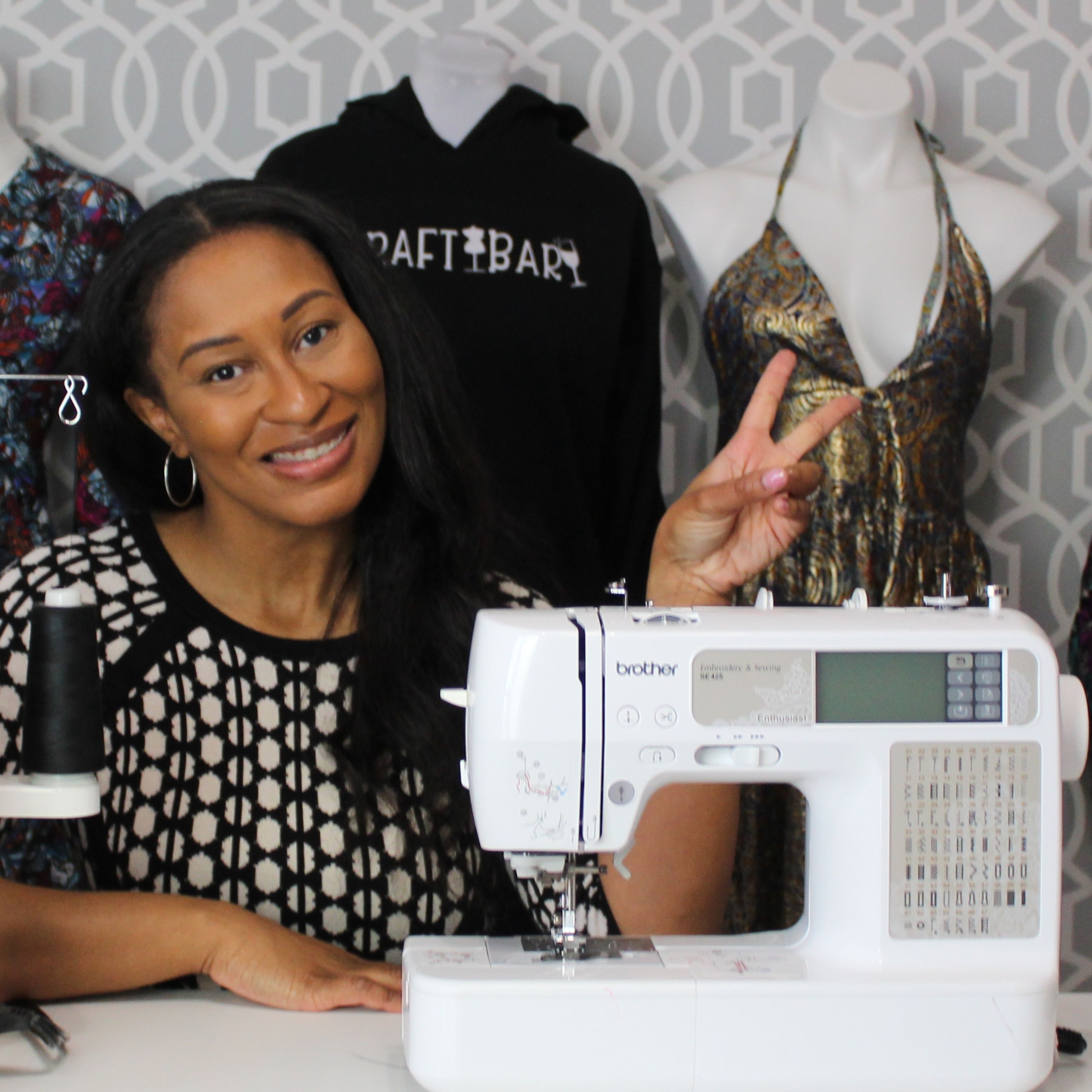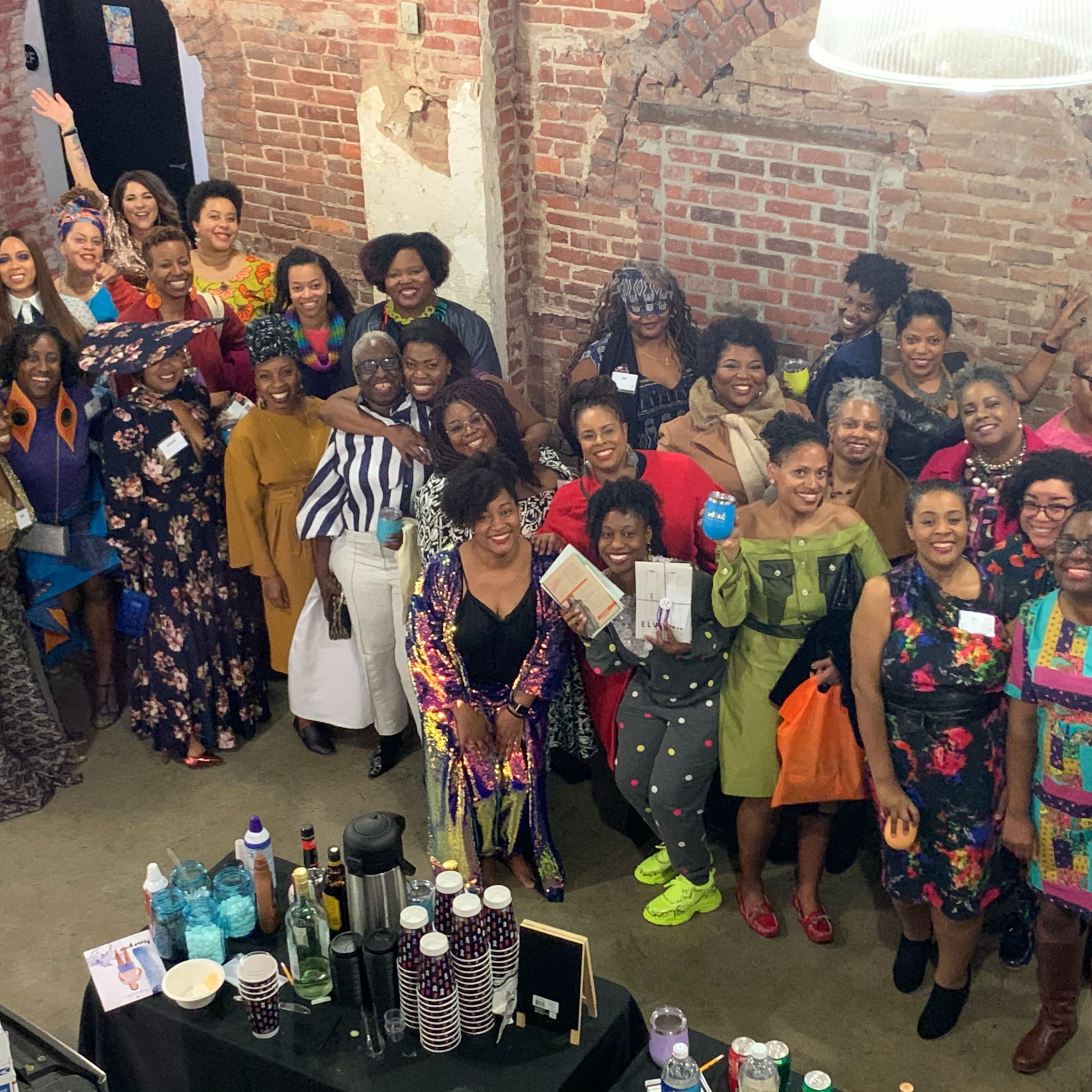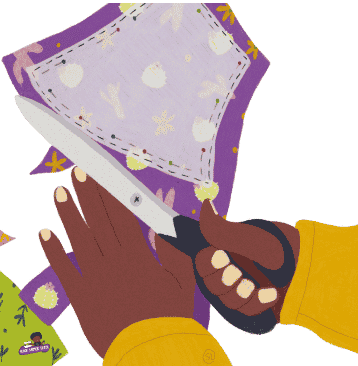Sign up for the Black Women Stitch quarterly newsletter!
Check out our merch here
Leave a BACKSTITCH message and tell us about your favorite episode.
Join the Black Women Stitch Patreon
Queen
Queen is a Bronx native with a Harlem heart, did college in Queens, currently resides in Brooklyn, and like most New Yorkers forgets Staten Island exists. Creating safe, nourishing spaces for Black femmes and folks impacted by misogynoir through digital media and live events is her style of activism. She is one half of The Tea with Queen and J. podcast and centers dismantling white supremacist patriarchal capitalism, because why the fuck not! Always encouraging healthy community building, her podcast’s annual Black podcast meetup, #PodinLiveNYC, has grown into the largest Black podcaster meetup in the world! Ms.Vixen, her online magazine, has been running 7 years strong, and with the addition of live events and workshops through the Ms.Vixen IRL series, plus Ms. Vixen The Podcast, she continues to deliver incisive, witty, lit womanist perspectives on pop culture, media, and politics. Queen’s work has also been featured at Afropunk.com, AMny, and you can catch her as a panelist on the youtube series, The Grapevine. Always someone with something to say, her goal is media domination, to always have huge hair, and to always stay fly.
J.
J. is a cultural critic, podcast producer, and a womanist race nerd from the Bronx focused on dismantling white supremacist patriarchal capitalism while laughing, drinking tea, and indulging in various forms of Black joy. For over five years she's created audio content centering Black women and Black femme-identifying individuals, exploring America's caste system, allowing herself to learn and be challenged publicly, and sharing her journey through mental health. As a podcast geek with a commitment to increasing visibility and access for people of color, she co-founded #PodinLiveNYC, the largest annual Black podcast meetup in the world. In addition to freedom and liberation, Janicia loves cosplay, believes there's a special place in her heart (and hell) for body paint, and lovingly asks that you do not call her a "lady".
Lisa Woolfork
Lisa Woolfork is an associate professor of English specializing in African American literature and culture. Her teaching and research explore Black women writers, Black identity, trauma theory, and American slavery. She is the founder of Black Women Stitch, the sewing group where Black lives matter. She is also the host/producer of Stitch Please, a weekly audio podcast that centers on Black women, girls, and femmes in sewing. In the summer of 2017, she actively resisted the white supremacist marches in her community, Charlottesville, Virginia. The city became a symbol of lethal resurging white supremacist violence. She remains active in a variety of university and community initiatives, including the Community Engaged Scholars program. She believes in the power of creative liberation.
Insights from this episode:
- Making spaces like music festivals feel more welcoming to queer folks
- Creating intergenerational events that appeal to everyone and avoid ageism
- The effect of marginalized people thinking from a scarcity mindset
- Who gets their work published and why
- Why it’s important to remember that there is always room for your voice and your story
- The role of capitalism in holding us back from pursuing our interests
Quotes from the show:
- “The community activated to provide a kind of care, and I think that is something that you really can’t harness or you can’t force.” – Lisa Woolfork, Stitch Please, Episode #195
- “I think as a marginalized person you’re always thinking about the deficit; you’re always thinking about the scarcity. On purpose you’re made to think there’s not enough for everyone, so you don’t ask for more. If there’s not enough, you won’t ask for more. If there’s not enough, you won’t require more. If there’s not enough, you won’t expect more. That’s just what is stuck down your throat as a marginalized person. So it is really important for us to remind everyone that the market can never be saturated. That language in itself is exclusionary to make you not want to do this, to make you think it’s not possible for you to be in a space.” – Queen, Stitch Please, Episode #195
- “People don’t think of all the players in capitalism and how invested corporations are in keeping independent creators, entrepreneurs, out of this space… They want to control the market, so they will tell you the market is flooded until they’re ready to play. There’s a lot at work to keep individuals from playing whatever the game is.” – J., Stitch Please, Episode #195
- “There’s a lot of that trying to maintain the status quo, and that is a symptom and a function of maintaining the capitalisty, and all of these little things work to the benefit of those on top of the financial hierarchy that we have, and that is power.” – J., Stitch Please, Episode #195
- “I think the question to ask is ‘who benefits?’. If you count yourself out, if you take yourself out of the game before you give yourself a chance, who benefits from that? You are not benefitting, because you're not following something you’re excited about. Don’t count yourself out. Don’t push yourself out because you’re afraid.” – Lisa Woolfork, Stitch Please, Episode #195
- “When I started this podcast, it was just like when I created Black Women Stitch. I built what I needed. I needed to know that there were other Black women, girls, and femmes out in the world doing things with needle and thread, that I did not have to turn to these sources that were crafted by white people for the benefit of other white people but told to me like ‘yes, you can do it too, but if it doesn’t fit you, then something’s wrong.’ None of that is the case. There absolutely is not just a history of us in this tradition, but also us being great innovators and making things that are completely new. And to also leave something behind for those who will come next and make sure that door is propped wide open for more flourishing to continue beyond just what’s happening right now. I think that anything we can do to make that more of a regular practice would be to the good. I really do.” – Lisa Woolfork, Stitch Please, Episode #195
- “None of us are free unless all of us are free. I don’t understand how we don’t appreciate that. You don’t get to just be a little bit racist. You don’t get to be a little bit oppressive of other people because it makes you feel better or because you think you have good reason for it. That is not the way to wholeness. It’s just not the way.” – Lisa Woolfork, Stitch Please, Episode #195
Resources Mentioned
- PodInLiveNYC
- Essence festival
Stay Connected:
YouTube: Black Women Stitch
Instagram: Black Women Stitch
Facebook: Stitch Please Podcast
Lisa Woolfork
Instagram: Lisa Woolfork
Twitter: Lisa Woolfork
Tea with Queen and J
Website: Tea with Queen and J
Instagram: teawithqj
Twitter: TeawithQJ
Facebook: teawithqueenandj
Tumblr: teawithqueenandj
Email: teawithqueenandj@gmail.com
Queen
Twitter: @TheQueenSpeaks_
Instagram: @TheQueenSpeaks_
YouTube: @MsVixen
Email: Contact@MsVixenmag.com
J.
Twitter: @JaniciaF
Instagram: @JaniciaF
Podcast: Drapetomaniax: Unshackled History
Subscribe to our podcast + download each episode on Stitcher, Apple Podcasts, and Spotify.
This episode was produced and managed by Podcast Laundry.
Sign up for the Black Women Stitch quarterly newsletter
Check out our merch here
Leave a BACKSTITCH message and tell us about your favorite episode.
Join the Black Women Stitch Patreon
Check out our Amazon Store
Stay Connected:
YouTube: Black Women Stitch
Instagram: Black Women Stitch
Facebook: Stitch Please Podcast



